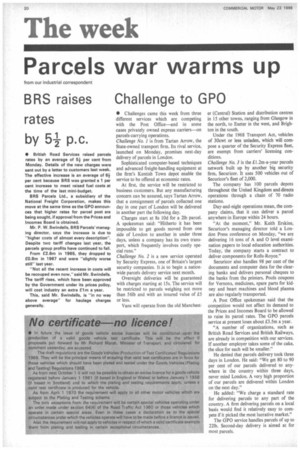Parcels war warms up
Page 22

If you've noticed an error in this article please click here to report it so we can fix it.
from our industrial correspondent
BRS raises Challenge to GPO rates by 5+ P.C.
• British Road Services raised parcels rates by an average of 51 per cent from Monday. Details of the new charges were sent out by a letter to customers last week. The effective increase is an average of 64per cent because BRS was granted a 1 per cent increase to meet raised fuel costs at the time of the last mini-budget.
BRS Parcels Ltd., a subsidiary of the National Freight Corporation, makes this move at the same time as the GPO announces that higher rates for parcel post are being sought, if approval from the Prices and Incomes Board is obtained.
Mr. P. W. Swindells. BRS Parcels' managing director, says the increase is due to "higher costs of almost every description". Despite two tariff changes last year, the parcels group profits have continued to fall.
From £2.6m in 1965, they dropped to £0.8m in 1967 and were "slightly worse still" last year.
"Not all the recent increase in costs will be recouped even now," said Mr. Swindells. The tariff rises, which have been approved by the Government under its prices policy, will cost industry an extra £1m a year.
This, said Mr. Swindells, is "in no way above average" for haulage charges generally.
• Challenges came this week from three different services which are competing with the Post Office—and in some cases privately owned express carriers—on parcels-carrying operations.
Challenge No. 1 is from Tartan Arrow, the State-owned transport firm. Its rival service, launched on Monday, promises next-day delivery of parcels in London.
Sophisticated computer-based techniques and advanced freight-handling equipment at the firm's Kentish Town depot enable the service to be offered at economic rates.
At first, the service will be restricted to business customers. But any manufacturing concern can be assured, says Tartan Arrow, that a consignment of parcels collected one day in one part of London will be delivered in another part the following day.
Charges start at as 10d for a 21b parcel. A spokesman said: "Hitherto it has been impossible to get goods moved from one side of London to another in under three days, unless a company has its own transport, which frequently involves costly special runs."
Challenge No. 2 is a new service operated by Security Express, one of Britain's largest security companies. It is to begin a nationwide parcels delivery service next month.
Overnight deliveries will be guaranteed with charges starting at 15s. The service will be restricted to parcels weighing not more than 56Ib and with an insured value of £5 or less.
Vans will operate from the old Manchest
er (Central) Station and distribution centres in 15 other towns, ranging from Glasgow in the north, to Exeter in the west, and Brighton in the south.
Under the 1968 Transport Act, vehicles of 30cwt or less unladen, which will compose a quarter of the Security Express fleet, are exempt from carriers' licensing conditions.
Challenge No. 3 is the £1.2m-a-year parcels network built up by another big security firm, Securicor. It uses 500 vehicles out of Securicor's fleet of 2,000.
The company has 100 parcels depots throughout the United Kingdom and directs operations through a chain of 70 radio stations.
Day-and-night operations mean, the company claims, that it can deliver a parcel anywhere in Europe within 24 hours.
"At the moment," Mr. Keith Erskine, Securicor's managing director told a London Press conference on Monday, "we are delivering 16 tons of A and 0 level examination papers to local education authorities. Today, the company starts a contract to deliver components for Rolls-Royce."
Securicor also handles 98 per cent of the documents and computer data for the clearing banks and delivers personal cheques to the banks from the printers. Pools coupons for Vernons, medicines, spare parts for kidney and heart machines and blood plasma are also regularly transported.
A Post Office spokesman said that the competition would not affect its demand to the Prices and Incomes Board to be allowed to raise its parcel rates. The GPO parcels service at present loses about £3.5m a year.
"A number of organizations, such as British Road Services and British Railways, are already in competition with our services. If another employer takes some of the cake, the slice for each will be smaller."
He denied that parcels delivery took three days in London. He said: "We get 80 to 90 per cent of our parcels delivered to anywhere in the country within three days, never mind London. A very high proportion of our parcels are delivered within London on the next day."
He added: "We charge a standard rate for delivering parcels to any part of the country. A firm delivering parcels on a local basis would find it relatively easy to compete if it picked the most lucrative market."
The GPO service handles parcels of up to 221b. Second-day delivery is aimed at for most parcels.
































































































































